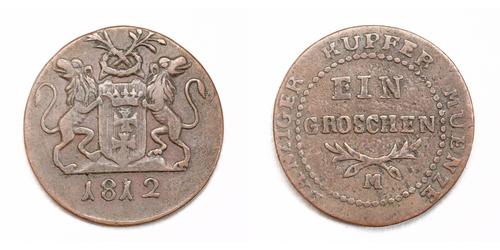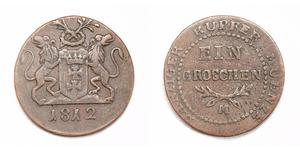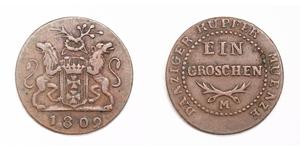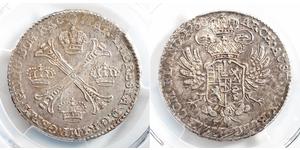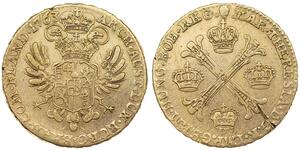1 Grosh Poland Copper Frederick William III of Prussia (1770 -1840)
1812, Poland, Danzig (City). Beautiful Copper Groschen (Grosz) Coin
Mint Year: 1812
Mint Place: Danzig
Reference: KM-137.
Denomination: Groschen (Grosz)
Mint Official: Johann Ludwi Meyer (M)
Material: Copper
Diameter: 21mm
Weight: 3.53gm
Gdansk (German: Danzig) is the city at the centre of the fourth-largest metropolitan area in Poland. It is Poland’s principal seaport as well as the capital of the Pomeranian Voivodeship. It is also historically the largest city of the Kashubian region. The city’s name is thought to originate from the Gdania river, the original name of the Motlawa branch on which the city is situated. Gdansk and Gdania are considered to be derivations from the Gothic name of the area (Gutiskandja), however this has also been questioned.
Frederick William III (German: Friedrich Wilhelm III.; 3 August 1770 – 7 June 1840) was King of Prussia from 16 November 1797 until his death in 1840. He was concurrently Elector of Brandenburg in the Holy Roman Empire until 6 August 1806, when the empire was dissolved.
Frederick William III ruled Prussia during the times of the Napoleonic Wars. The king reluctantly joined the Sixth coalition against Napoleon in the German Campaign of 1813. Following Napoleon’s defeat, he took part in the Congress of Vienna, which assembled to settle the political questions arising from the new, post-Napoleonic order in Europe. His primary interests were internal – the reform of Prussia’s Protestant churches. He was determined to unify the Protestant churches to homogenize their liturgy, organization, and architecture. The long-term goal was to have fully centralized royal control of all the Protestant churches in the Prussian Union of Churches. The king was said to be extremely shy and indecisive. His wife Queen Louise (1776–1810) was his most important political advisor. She led a mighty group that included Baron Heinrich Friedrich Karl vom und zum Stein, Prince Karl August von Hardenberg, Gerhard von Scharnhorst, and Count August von Gneisenau. They set about reforming Prussia’s administration, churches, finance, and military. He was the dedicatee of Beethoven’s Ninth Symphony in 1824.
(3205 X 1502 pixels, file size: ~733K)
Posted by: anonymous 2023-11-28
1812, Poland, Danzig (City). Beautiful Copper Groschen (Grosz) Coin. VF+ Mint Year: 1812 Mint Place: Danzig Reference: KM-137.Denomination: Groschen (Grosz)Mint Official: Johann Ludwi Meyer (M) Condition: Minimal deposits, otherwise VF+ Material: Copper Diameter: 21mm Weight: 3.53gm ...
(3205 X 1502 pixels, file size: ~669K)
Posted by: anonymous 2023-11-28
1809, Poland, Danzig (City). Beautiful Copper Groschen (Grosz) Coin. VF+ Mint Year: 1809 Mint Place: Danzig Reference: KM-137.Denomination: Groschen (Grosz)Mint Official: Johann Ludwi Meyer (M) Condition: Minimal deposits, otherwise VF+ Material: Copper Diameter: 20mm Weight: 2.77gm ...
1/2 Kronenthaler Netherlands Silver
group has 9 coins / 8 prices
⇑
11 coins were uploaded from 2025-06-18 to 2025-06-25
One of them is:

